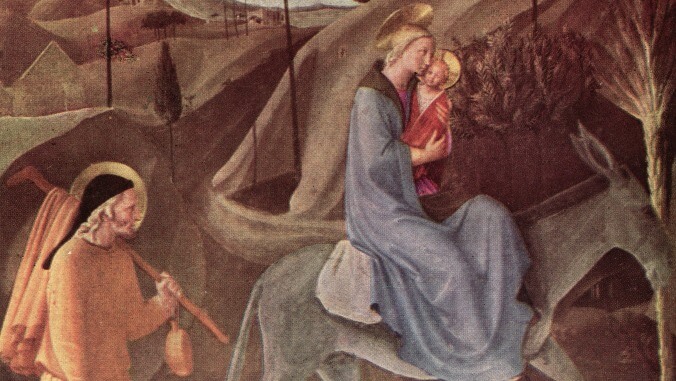The medieval Feast of the Ass isn’t as filthy as it sounds

We explore some of Wikipedia’s oddities in our 6,230,819-week series, Wiki Wormhole.
This week’s entry: Feast of the Ass
What it’s about: Not what it sounds like! (Sorry to disappoint!) As every single detail of the Nativity story has been dissected and given its own Christmas carol, even the donkey that enabled Mary, Joseph, and the baby Jesus’ flight into Egypt gets its own holiday. So the feast is merely a celebration of that particular ass, and no asses, in any sense of the word, are eaten.
Biggest controversy: The Feast of the Ass began as an offshoot of the Feast of Fools, essentially a medieval Christian equivalent to Saturnalia, in which social norms were overturned. Higher- and lower-level clergy would switch roles, church rituals would be satirized, and traditions would be mocked. It seemed to be a carefully scripted performance, but not many details have survived, as later generations of Catholics were eager to downplay or cover up what Wikipedia describes as, “almost blasphemous extravagances.” The 1431 Council of Basel forbid the Feast of Fools, and it’s been largely forgotten.
Strangest fact: Wikipedia tells us the Feast of the Ass is likely a Christianized version of the Roman festival of Cervula, but the page on Cervula mentions nothing whatsoever about the Roman festival, and re-explains the Feast of the Ass, with details that don’t overlap with the feast’s page.
Thing we were happiest to learn: No asses were harmed in the making of this feast. Part of the festivities include a messenger riding an ass into town, hurting the animal with his spurs, until an angel descends and chastises the messenger for cruelty. From what records do survive, it seems a wooden ass was used as a stand-in—Wikipedia uses the phrase “hobby ass,” so enjoy that)—so no actual asses were spurred. (A live animal also would have had to stand still next to the altar for the duration of an entire Mass).
Thing we were unhappiest to learn: Unsurprisingly, the Feast of the Ass managed to work in just a little anti-Semitism. The ceremony seems to have been based on the 6th-century “Sermo contra Judaeos,” or, “Sermon against Jews.” The Feast opened with a priest impersonating a Hebrew prophet, and using their “Messianic utterances” to establish the divinity of Christ, satisfied that he had, “confuted the Jews out of the mouths of their own teachers.”
Also noteworthy: The Feast hasn’t really been a thing for about 600 years. Once the Feast of Fools was banned, the Feast of the Ass followed suit shortly thereafter—though it is noted that the latter “was not considered as objectionable” as the former.
Best link to elsewhere on Wikipedia: The Sermo contra Judaeos was part of a genre known as pseudo-Augustinian religious text. There are enough works falsely attributed to St. Augustine, (also known as Augustine of Hippo), to fill an entire category, despite genuinely Augustinian works having been cataloged by the saint and his friend and disciple Possidius.
Further Down the Wormhole: The Feast of the Ass takes place on January 14, which is also the birthday of The Today Show, previous worst-traitor-in-American-history Benedict Arnold, Steven Soderbergh, LL Cool J, and Dave Grohl. Grohl, who provided one of 2020’s few highlights by engaging in a public drum battle with 10-year-old percussion prodigy Nandi Bushell, has also been waging a war against foo for over 25 years, leading to an extensive List of songs recorded by Foo Fighters. Besides countless Grohl compositions, the band has performed covers including “Holiday In Cambodia”; “Darling Nikki”; and “867-5309/Jenny,” the ubiquitous 1981 hit performed by Tommy Tutone and written by Jim Keller and Alex Call. Call was the frontman for Clover, a quietly influential act that is the Rosetta Stone of 1980s pop rock. We’ll find the hidden thread that connects Elvis Costello, Toto, and The Doobie Brothers next week.